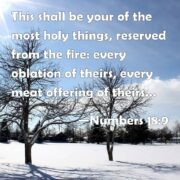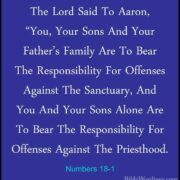The Joy in Giving
A wide array of offerings were brought to the Lord at the chosen place of worship. The following shows the heart of the people to give. Each person did not just give the tithe or the offering, they brought in the tithe with different kinds of offerings. It shows a collective act of generosity.
- The “burnt offerings” were fully burnt and offered to God.
- The term “sacrifices” when used alongside burnt offerings, usually refers to offerings that were not totally burned. The fat was “burned as the Lord’s portion and the remaining parts [went] to the priests and the offerer” (Craigie).
- Several other offerings are to be brought into the place of worship. “Tithes” consist of a tenth of produce of the land or livestock (see the discussion
on 14:22–29).
- The “contribution” mentioned next seems to refer to “holy gifts given to priests.”
- Then there were “vow offerings,” which are gifts given in fulfillment of vows made earlier.
- Just as God freely showed his love toward the people, they in turn respond with “freewill offerings”—offerings given voluntarily.
- Finally, they are to bring “the firstborn of your herd and of your flock” (see the discussion on 15:19–23)
- An allowance was made to pay a ransom (usually a little higher than the cost) and redeem these animals (Exodus 13:11–16)
The Jewish culture was accustomed to bringing the offering to the altar. The priests mostly had something in their hand to waive or to heave, because the people brought in the offering. As a result of these acts of worship, a sweet aroma was sent up to the Lord. The offering was waved or heaved so that the Lord “noticed” them. It required an offering for God to show up. In our present day culture, it will require money for God’s presence to show up. Before you find that materialistic, let me explain. It is when the people sacrificed their money that they were able to chip away greed and the idolatry of money from their lives. It is when worshipers show that they can part with the little god of material wealth that God can show up in their midst to display His glory. Otherwise, it is all lip service. They say they worship God, but really, they are clinging to manna.
Giving can be done willingly and cheerfully, because they are aware in their hearts of who their Master is — and it is not money. The people’s security and future does not depend on manna. The verse said that there would be joy. The importance of joy is emphasized by the fact that it is referred twice more in this chapter, in connection with sacrifice and offerings (Deut. 12:12, 18).
Your weekly dose of prophetic wisdom and anointing awaits you. Join our LIVE Conference Call!
1) Call 515-604-9266
2) Go to startmeeting.com, and use the login: BishopJordan











